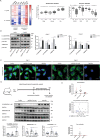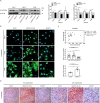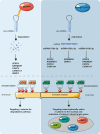MCPIP1 inhibits Wnt/β-catenin signaling pathway activity and modulates epithelial-mesenchymal transition during clear cell renal cell carcinoma progression by targeting miRNAs
- PMID: 34657130
- PMCID: PMC8677621
- DOI: 10.1038/s41388-021-02062-3
MCPIP1 inhibits Wnt/β-catenin signaling pathway activity and modulates epithelial-mesenchymal transition during clear cell renal cell carcinoma progression by targeting miRNAs
Abstract
Epithelial-mesenchymal transition (EMT) refers to the acquisition of mesenchymal properties in cells participating in tumor progression. One hallmark of EMT is the increased level of active β-catenin, which can trigger the transcription of Wnt-specific genes responsible for the control of cell fate. We investigated how Monocyte Chemotactic Protein-1-Induced Protein-1 (MCPIP1), a negative regulator of inflammatory processes, affects EMT in a clear cell renal cell carcinoma (ccRCC) cell line, patient tumor tissues and a xenotransplant model. We showed that MCPIP1 degrades miRNAs via its RNase activity and thus protects the mRNA transcripts of negative regulators of the Wnt/β-catenin pathway from degradation, which in turn prevents EMT. Mechanistically, the loss of MCPIP1 RNase activity led to the upregulation of miRNA-519a-3p, miRNA-519b-3p, and miRNA-520c-3p, which inhibited the expression of Wnt pathway inhibitors (SFRP4, KREMEN1, CXXC4, CSNK1A1 and ZNFR3). Thus, the level of active nuclear β-catenin was increased, leading to increased levels of EMT inducers (SNAI1, SNAI2, ZEB1 and TWIST) and, consequently, decreased expression of E-cadherin, increased expression of mesenchymal markers, and acquisition of the mesenchymal phenotype. This study revealed that MCPIP1 may act as a tumor suppressor that prevents EMT by stabilizing Wnt inhibitors and decreasing the levels of active β-catenin and EMT inducers.
© 2021. The Author(s).
Conflict of interest statement
The authors declare no competing interests.
Figures








References
-
- Behrens J, Jerchow BA, Würtele M, Grimm J, Asbrand C, Wirtz R, et al. Functional interaction of an axin homolog, conductin, with beta-catenin, APC, and GSK3beta. Science. 1998;280:596–9. - PubMed
-
- Kurose K, Sakaguchi M, Nasu Y, Ebara S, Kaku H, Kariyama R, et al. Decreased expression of REIC/Dkk-3 in human renal clear cell carcinoma. J Urol. 2004;171:1314–8. - PubMed
Publication types
MeSH terms
Substances
LinkOut - more resources
Full Text Sources
Molecular Biology Databases
Research Materials
Miscellaneous

